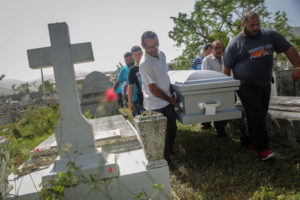
According to a Harvard study released yesterday, Hurricane Maria likely killed thousands of people in Puerto Rico last year, more than 70 times the official estimate.
“Our results indicate that the official death count of 64 is a substantial underestimate of the true burden of mortality after Hurricane Maria,” the study says.
Authorities in Puerto Rico placed the death toll at 64 after Maria roared through the island Sept. 20, destroying buildings and knocking out power to virtually the entire U.S. territory of more than 3 million people.
Researchers at the Harvard T.H. Chan School of Public Health, however, surveyed more than 3,000 households on the island and concluded that that at least 4,645 “excess deaths” occurred during the storm and the weeks that followed. The researchers said the number was conservative and that the death toll likely exceeded 5,000. Many of the deaths were due in part to power outages that crippled medical and other services.
The Harvard study notes that in Puerto Rico every disaster-related death must be confirmed by the Institute of Forensic Sciences. The system counts only bodies that are brought to San Juan or were confirmed by a medical examiner traveling to the local municipality.
Another problem is that the system also fails to count indirect deaths resulting from worsening of chronic conditions or from delayed medical treatments. Maria raked across Puerto Rico as a Category 4 hurricane, the strongest storm to hit the island in 89 years and among the strongest ever to strike the U.S.
Rep. Bennie Thompson, D-Miss., who serves on the House Committee on Homeland Security, issued a statement calling the Harvard totals “heartbreaking” and describing the federal response to the storm as “woefully inadequate.”
“The 2018 hurricane season begins this week, and it is critical that we do not repeat the mistakes of last year,” Thompson said. “We can and must do better for all Americans.”